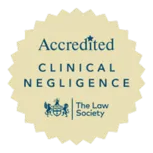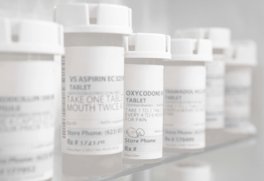
Kelly Withers
Partner & Senior Associate Solicitor, Medical Negligence
We’ve recovered hundreds of millions of pounds in compensation for people who have suffered because of medical negligence. We’ve also helped them access the specialist care, treatment, and rehabilitation they need to start to rebuild their lives.
We understand that taking legal action can be daunting, but we pride ourselves on our friendly and supportive approach. When you come to us, you can expect a personal service tailored to you and your needs.
With years of experience in Medical Negligence Law, we understand how life-changing an injury that wasn’t your fault can be. Our experience allows us to offer the support and guidance you need, helping you take the first steps toward rebuilding your life.
You can trust that when you talk to our Medical Negligence Solicitors, they will listen with sensitivity and compassion. We’re members of the Law Society’s Clinical Negligence Accreditation Scheme and the Action against Medical Accidents (AvMA) Solicitors referral panel.
Our experience and reputation have allowed us to build strong connections with various agencies and support services, providing valuable resources for you and your family if medical negligence has upended your life.
Fill in the form below to get in touch with one of our dedicated team members, or call our team today on: 0800 260 5010
Medical negligence occurs when doctors, nurses or other healthcare professionals fail in their duty of care to you. They may make serious mistakes that harm you or cause an existing condition to worsen.
For medical negligence to be proven, it must be shown that on the balance of probabilities the care you received did not meet typical standards and caused your injury or illness.
If a healthcare professional breaches their duty of care and causes you to suffer injury or an existing condition to worsen, you can make a medical negligence claim. Most claims are made against the NHS Trust that the healthcare professional works for.
As well as causing injury or the worsening of an existing condition, medical negligence can also be caused by doctors or GPs not diagnosing or misdiagnosing you.
We know how devastating it is to receive negligent treatment from a professional you trust to help heal you. You can rely on us to take care of everything to do with the claim and assist in getting you an early treatment plan and rehabilitation to speed up your recovery.




There are many reasons why you may want to make a claim.
A successful outcome could help you start to rebuild your life and feel a sense of justice. Whether your incident happened with the NHS or a private medical practice, a successful claim could help change processes and procedures so others don’t suffer.
Medical negligence compensation can cover things such as:
If you have developed a separate condition, for example sepsis, or your existing condition worsens during or after receiving medical care, the healthcare professional who treated you may have been negligent. Medical negligence can also happen if a doctor does not diagnose you correctly or fails to diagnose you condition.
It can be difficult to tell if what your symptoms or condition was caused by negligence. Our medical negligence team have the expertise and experience to identify if negligence is the cause of your suffering. You can be confident that we, with the help of healthcare professionals we trust, can quickly tell if you have a claim.

We can assist you with the following claims:
To start a medical negligence claim, contact us as soon as possible. We offer a free initial consultation where we’ll listen to what has happened to you and let you know if we can help. We’ll also discuss how No Win, No Fee works and talk to you about what evidence we’ll need to prove your claim.
Our Solicitors will gather evidence, including a statement from you and any other witnesses to prove on the balance of probabilities that your injury was caused by a healthcare professional’s negligent actions or lack of action.
You may have to have an independent medical assessment, and we’ll instruct expert witnesses to help support your claim and provide a prognosis which assists the Court in calculating how much damages to award.
Check out this guide to proving causation in medical negligence claims.
You may have a successful case if a doctor, nurse or hospital treating you was in breach of their duty of care to you.
This duty of care includes:
Contact us for a Free Claims Assessment today and we can tell you if we think you could make a medical negligence claim.
At Simpson Millar, we offer No Win, No Fee so you do not need to worry about paying legal costs if you lose your case.




If we can help you, we will explain everything about No Win, No Fee. If you’re happy, you sign an agreement that means that you do not pay any legal fees unless you win your case. We can also provide After The Event (ATE) insurance which will pay out the other side’s legal costs if you lose your case.
The most important thing that No Win, No Fee provides is peace of mind that you will not receive a large legal bill if your case is unsuccessful. We take all the risk so you can focus on your recovery.
If you have been seriously injured due to medical negligence, our experienced Solicitors will, as part of the pre-action protocol for clinical disputes and the Rehabilitation Code, ask NHS Resolution to provide interim payments to fund rehabilitation and treatment. If this is refused, we will keep pushing and provide updates on your progress, continuing to flag any issues that could be treated by early rehabilitation.
Navigating medical negligence claims can seem daunting, but understanding the general guidelines can make the process smoother.
Typically, you must initiate a claim within three years of discovering negligent treatment. Injuries or illnesses may worsen or develop over time before you are aware of the issue, so claims are not always immediate.
There are a few vital exceptions including:




This depends on several things including the severity of the medical negligence and the injury you suffered as a result and whether the NHS Trust or private healthcare provider involved acknowledges blame.
We make every effort to resolve medical negligence claims swiftly, but complex cases can take up many years to complete. In these cases, we can get access to treatment, rehabilitation, and interim payments should they be needed.
Claiming medical negligence can be a daunting and emotional process, as it involves dealing with the negative results of a healthcare professional's actions. You may have been under the care of the person who acted negligently for some time and therefore feel guilty about making a claim against them. But it is important to remember that the purpose of medical negligence claims is to not only hold the responsible party accountable for their actions but also to secure the compensation you need to recover and, if necessary, make changes to your home, vehicle, and other parts of your environment so you can live independently.
By pursuing a medical negligence claim, you can receive much-needed support, including financial assistance and access to additional resources for your ongoing care.

The amount of compensation awarded for Medical Negligence Claims varies depending on the type of injury and your long term prognosis.
Medical negligence compensation awards are split into two categories:
Making a medical negligence claim against the NHS can definitely be pursued if you have experienced delayed diagnosis, misdiagnosis or negligence from an NHS professional within the last three years.
Taking this step may appear challenging, but rest assured that our knowledgeable medical negligence solicitors are here to guide and support you throughout the process.
By working with our legal experts that have extensive experience in handling cases involving medical negligence, you can feel confident in moving forward with your claim.
Having a child suffer medical negligence can bring a wave of emotions, including anger, stress, anxiety, and sadness. We will be there to help you claim compensation on behalf of your child so they can access the rehabilitation and treatment they need to recover as fully as possible.
The first thing you should do is contact us. We will give you the legal advice you need and help you put in place a care plan. And throughout the medical negligence claims process, we will stand firmly by your side, getting the compensation your child needs.
We’ve secured compensation for thousands of people in the past that have suffered medical negligence. Here are just two examples.

East Cheshire NHS Trust sends ‘sincere condolences’ for failings in Jack Hilton’s care. The parents of a young man with learning difficulties who died after doctors failed to diagnose him with sepsis have finally received a ‘proper letter of apology’ from the East Cheshire NHS Trust, two years after it admitted to failings in his care.

A boy who suffered brain damage at birth and went on to develop cerebral palsy as a result of delays in his delivery has today been awarded a compensation package worth in excess of £15million by the High Court.

Our client was being treated for Crohn’s disease but was prescribed the wrong medication, which reacted to elevated levels of creatinine in her blood. This was in breach of guidelines from the National Institute for Health and Care Excellence (NICE), and triggered chronic kidney disease
Most medical negligence claims are settled outside of court. But if your claim is complex, for example, a birth injury that has resulted in Cerebral Palsy or a brain injury resulting from sepsis, your claim may proceed to court. If it does, we will explain everything to you and make the process as stress-free as possible.
Yes, you can make a claim on behalf of your child or act as a Litigation Friend for someone who lacks mental capacity.
We can act for you on a No Win, No Fee basis which means if you lose your claim, you will not have to pay any legal fees. You may need to pay any expenses related to your case. We will fully explain the costs of bringing your claim to you at the initial consultation meeting.
Yes, all healthcare professionals, no matter who they work for, must provide treatment that reaches the correct standard of care. We can help you bring a claim against a private healthcare provider.
If the NHS believes a particular type of surgery or treatment or a healthcare professional has fallen below the correct standard of care, they will contact anyone affected.
You are likely to be offered an independent review of your treatment. During and/or after the review, you can contact us, and we will advise you as to whether you have a medical negligence claim.
If you have concerns about your GP, you can use the surgery’s complaints procedure. The NHS also has a complaints procedure patients can use.
If you are not satisfied with the result, you can make a complaint to the General Medical Council.
The NHS budget covers its legal fees. But when it comes to compensation awards, the Government set up NHS Resolution which acts as an insurance company. Each year, all NHS Trusts pay a premium to NHS Resolution, the same way you pay your insurance company to insure your car or home. This way, compensation awards do not come out of the NHS budget.
Yes, you can change Solicitors at any time during the claims process. We will advise you how to do this and ask your former Solicitors for all the information relating to the claim which they must hand over.
In the UK, compensation for medical negligence and personal injury are generally tax free. But with large settlements, income tax from investments and capital gains tax may be an issue. Your benefits may also be affected. Our Court of Protection team can advise you on setting up a Personal Injury Trust and refer you to specialist tax professionals to make sure your compensation payment is protected from tax.
If a Defendant admits liability, it means that its insurers have accepted that negligence occurred and if the case goes to court, they are likely to lose.
Yes, you can make a compensation claim for wrongful death. We will provide sensitive advice and support you through this process.

In April 2023, The Times published figures showing that the NHS spent £160 million on paying bereaved people last year where, as a result of their failures, people had passed away for a range of different reasons.

Fill in the form below to get in touch with one of our dedicated team members, or call our team today on: 0800 260 5010